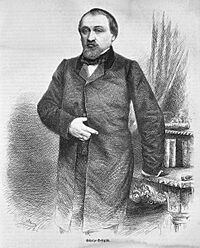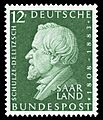Franz Hermann Schulze-Delitzsch facts for kids
Quick facts for kids
Hermann Schulze-Delitzsch
|
|
|---|---|

Schulze-Delitzsch in 1863, Leipzig.
|
|
| Born | 29 August 1808 |
| Died | 29 April 1883 (aged 74) |
| Nationality | German |
| Institution | Prussian National Assembly, Reichstag |
| Field | Microfinance Microeconomics |
| School or tradition |
Co-operative economics |
| Alma mater | Leipzig University Heidelberg University (Hc) |
| Influences |
|
| Contributions | Credit Union Bond of association Cooperative banking |
Franz Hermann Schulze-Delitzsch, also known as Hermann Schulze, was a German politician and expert in economics. He was born on August 29, 1808, and passed away on April 29, 1883. He is famous for helping to create the world's first credit unions. He also helped start a political group called the German Progress Party.
Contents
Early Life and Education
Hermann Schulze-Delitzsch was born in a town called Delitzsch, which was part of Saxony. He went to Leipzig and Halle universities to study law. When he was 30 years old, he became a legal assistant in Berlin. A few years later, he became a judge in Delitzsch.
Entering Politics and New Ideas
In 1848, Schulze-Delitzsch joined the parliament. He became part of a political group known as the Left Centre. Around this time, his name changed from Schulze to Schulze-Delitzsch. The name of his hometown, Delitzsch, was added to his last name. This helped people tell him apart from other politicians named Schulze in the parliament.
He led a group that looked into the lives of workers and craftspeople. He realized that these smaller businesses needed to work together. This way, they could compete against bigger businesses and wealthy capitalists.
Starting People's Banks
Schulze-Delitzsch was a member of the Second Chamber of parliament from 1848 to 1849. However, he had some disagreements with high-ranking legal officials. So, in October 1851, he left his public jobs and went back to Delitzsch.
There, he focused on creating and growing co-operative groups in Germany. He started the first "Vorschussvereine" (which means "advance associations" or "people's banks") in Delitzsch in 1850. These banks grew very quickly. By 1858, he wrote a book where he mentioned that 25 such banks already existed. In these banks, people could deposit small amounts of money. In return, they could get loans and earn a share of the profits. The members themselves managed these banks.
Growing the Co-operative Movement
By 1859, there were more than 200 of these banks. Schulze-Delitzsch helped organize them all together. He also helped set up the first "Genossenschaftstag," which was a meeting for co-operative groups, held in Weimar. He then created a main office for all co-operative societies.
In 1861, he returned to the Prussian Chamber of parliament. He became an important member of the Progressist party. In 1863, he received a large sum of money as a gift, which was about $1.1 million in today's money. He used most of it to support his co-operative organizations and offices. However, he always believed that these groups should be able to support themselves. The next few years were spent setting up local centers and creating the Deutsche Genossenschafts-Bank in 1865.
Laws for Co-operatives
As these co-operative groups became more popular, new laws were needed to support them. Schulze-Delitzsch was key in making these laws happen. As a member of the Chamber in 1867, he helped pass the Prussian law of association. This law was later expanded to the North German Confederation in 1868 and then to the entire German Empire. He also helped make sure the laws were similar across all German states. He did this by publishing a book in 1869 about the legal standing of these co-operative groups.
With these laws in place, his main life's work was complete. He had made it possible for small business owners and craftspeople across Germany to access money and work together.
Later Years and Legacy
Schulze-Delitzsch spent his remaining years making sure his work continued to be strong. He wanted people to learn to rely on themselves to improve their lives. He believed that the government should only make sure that people had freedom in their work and personal lives.
He worked tirelessly as a writer and as a member of the Reichstag (the German parliament). He passed away on April 29, 1883, in Potsdam. He is remembered as a great helper for smaller business owners and craftspeople.
When he died, there were 3,500 co-operative banking branches in Germany alone. They held over $100,000,000 in deposits. His system had also spread to other countries like Austria, Italy, Belgium, and Russia. His important work was even mentioned in Leo Tolstoy's famous novel, Anna Karenina.
Images for kids
See also
- Bond of association
- Friedrich Wilhelm Raiffeisen
- History of credit unions
 | Selma Burke |
 | Pauline Powell Burns |
 | Frederick J. Brown |
 | Robert Blackburn |




